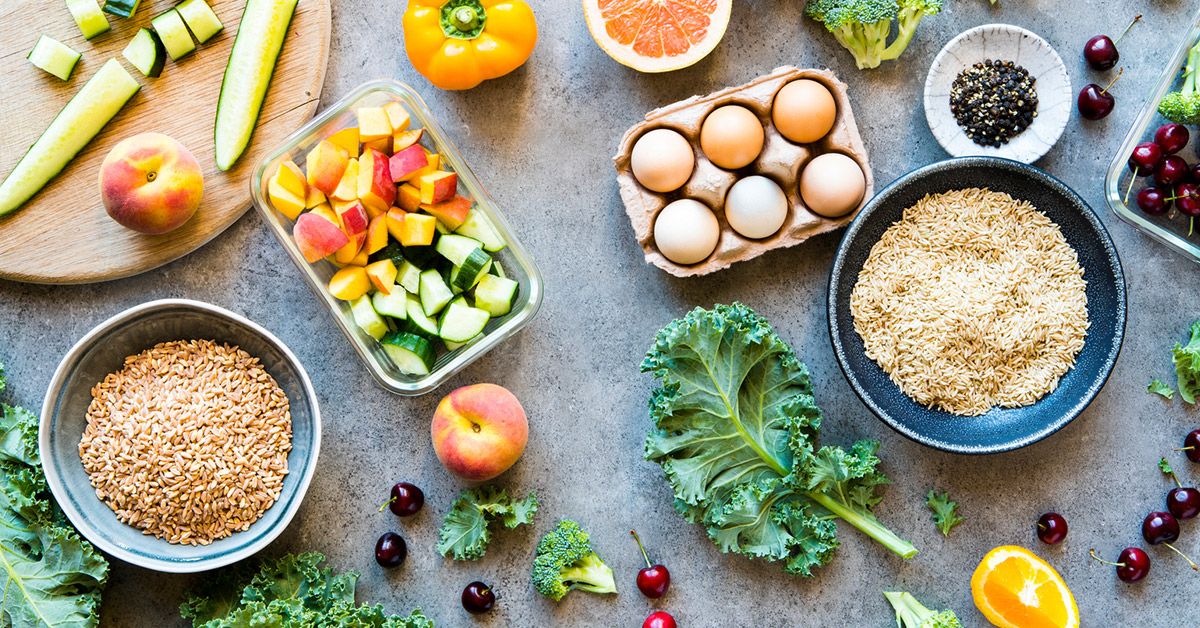The Ultimate Guide to Cooking with Gluten Free BBQ Sauce on a Plant-Based Diet
The Ultimate Guide to Cooking with Gluten Free BBQ Sauce on a Plant-Based Diet
Blog Article
Everything About Healthy And Balanced Food: Benefits of Enjoying Plant Based Alternatives
The discussion surrounding plant-based diet plans has actually obtained substantial interest over the last few years. Lots of individuals are checking out the potential health benefits, nutritional benefits, and ecological impacts related to these nutritional options. As individuals come to be extra familiar with their food's impact on well-being and sustainability, inquiries occur regarding the usefulness of adopting such a way of life. What details adjustments can one expect, and how might these choices improve not just personal health and wellness yet also the planet's future?
Comprehending Plant-Based Diet Regimens
Although lots of people link plant-based diets mostly with vegetarianism or veganism, these diets can incorporate a vast array of consuming patterns that prioritize whole, minimally processed plant foods. Such diet plans commonly include fruits, veggies, whole grains, seeds, nuts, and vegetables, while removing or restricting pet items. This versatility allows individuals to tailor their nutritional choices according to nutritional needs and individual choices. Some may adopt a mainly plant-based diet plan while still periodically consuming meat or dairy, often referred to as a flexitarian technique. The emphasis remains on integrating even more plant foods, which can cause a varied range of flavors and meals. Comprehending these different analyses of plant-based eating is essential for valuing its availability and charm in contemporary food society.
Health And Wellness Advantages of Plant-Based Foods
The wellness advantages of plant-based foods are significant, supplying a nutrient thickness advantage that sustains general wellness. Research study indicates that these foods can enhance heart health and wellness and play an essential duty in reliable weight management. By including extra plant-based alternatives, people might improve their nutritional selections and promote long-term wellness.
Nutrient Density Advantage
Nutrient thickness plays a necessary role in the health and wellness benefits of plant-based foods, making them an engaging option for those seeking a balanced diet plan. Plant-based foods, such as fruits, vegetables, vegetables, nuts, and entire grains, are frequently rich in crucial vitamins, minerals, and antioxidants while being reduced in calories. This high nutrient thickness permits people to eat less calories while still meeting their dietary demands. In addition, these foods are loaded with dietary fiber, promoting gastrointestinal wellness and assisting in weight management. By including nutrient-dense plant-based choices, consumers can enhance their general health, support their immune systems, and reduce the risk of chronic illness. Ultimately, the nutrient density of plant-based foods underscores their value in a health-conscious way of life.
Heart Health And Wellness Improvement

Weight Monitoring Support
In addition to promoting heart health, a plant-based diet plan can considerably aid in weight administration. This nutritional approach stresses whole foods such as fruits, veggies, beans, nuts, and whole grains, which are generally reduced in calories and higher in fiber compared to animal-based products. The high fiber web content assists increase satiation, lowering general calorie intake. Additionally, plant-based diets are frequently rich in necessary nutrients while low in undesirable fats, making it less complicated to keep a healthy and balanced weight. Plant Based Beef. Study suggests that people that embrace a plant-based way of life have a tendency to have reduced body mass indexes (BMIs) and experience more successful weight management contrasted to those that eat meat-heavy diets. Embracing plant-based alternatives is a calculated choice for reliable weight monitoring.
Nutritional Value of Plant-Based Active Ingredients
Plant-based components are rich in crucial nutrients, providing a varied range of vitamins, minerals, and anti-oxidants that add to total wellness. A contrast of protein sources exposes that while pet items are usually considered as superior, numerous plant-based alternatives provide ample protein and other useful substances. Comprehending the dietary worth of these ingredients can aid individuals make informed dietary options.
Vital Nutrients in Plants
Nutrient-rich active ingredients located in plants use a diverse selection of essential minerals and vitamins that contribute significantly to general wellness. These active ingredients are abundant in vitamins A, C, and K, which sustain immune function, vision, and blood clot, respectively. Additionally, plants provide vital minerals such as calcium, potassium, and magnesium, critical for heart health, muscle feature, and bone stamina. The existence of fiber in plant-based foods aids food digestion and advertises a healthy and balanced gut microbiome. Anti-oxidants, discovered generously in vegetables and fruits, aid fight oxidative stress and anxiety and lower inflammation. Furthermore, many plant foods are low in calories yet high in nutrients, making them an outstanding option for those seeking to maintain a healthy weight while making certain ideal nutrient intake.
Comparing Healthy Protein Sources
Healthy protein sources vary substantially in their nutritional profiles, with plant-based active ingredients supplying special advantages. Unlike pet proteins, which often contain hydrogenated fats and cholesterol, plant healthy proteins tend to be lower in these unhealthy parts. Legumes, nuts, seeds, and entire grains are rich in essential amino acids, fiber, vitamins, and minerals. For example, lentils give high protein content along with substantial iron and folate, while quinoa is read the full info here a complete healthy protein, supplying all 9 essential amino acids. Additionally, plant-based proteins are commonly gone along with by antioxidants and phytochemicals that sustain total health and wellness. The shift to official statement plant-based protein sources not just improves nutritional intake however additionally aligns with lasting dietary techniques, decreasing ecological effect and advertising long-term health advantages.
Ecological Influence of Plant-Based Eating
As understanding of environment adjustment grows, numerous individuals are checking out lasting dietary options that can considerably decrease their ecological impact. Plant-based eating has become a considerable factor to lowering greenhouse gas emissions, which are mainly linked with livestock manufacturing. The farming of fruits, vegetables, grains, and vegetables normally requires fewer sources, such as water and land, compared to pet farming. In addition, plant-based diet plans can result in lowered deforestation, as less land is needed for grazing animals or growing animal feed. By changing towards plant-based alternatives, consumers can support biodiversity and advertise much healthier ecological communities. In general, welcoming plant-based eating not only benefits individual health but also stands for an important action toward environmental sustainability and conservation efforts.
Overcoming Common Misconceptions
While several individuals identify the advantages of a plant-based diet regimen, several mistaken beliefs frequently prevent them from completely accepting this way of life. A typical idea is that plant-based diet plans lack sufficient protein; nevertheless, various plant sources, such as beans, nuts, and tofu, supply sufficient protein. Furthermore, some presume that this diet is expensive, when in fact, staples like beans, rice, and seasonal veggies can be quite economical. Another mistaken belief is that plant-based eating is overly restrictive, whereas it actually offers a diverse variety of foods and flavors. Numerous fret that a plant-based diet may lead to shortages, yet with appropriate planning, individuals can acquire all essential nutrients, consisting of vitamins and minerals, while appreciating a broad variety of scrumptious meals. Vast Tips for Transitioning to a Plant-Based Way of life
Making the shift to a plant-based way of living can be an improving experience, though it commonly calls for some guidance to navigate the first modifications. Initially, individuals are urged to start progressively, incorporating even more fruits, veggies, legumes, and entire grains into their meals while lowering meat and dairy usage. Dish planning is necessary; preparing a regular menu can aid alleviate the adjustment and prevent last-minute undesirable choices. Exploring new recipes and cooking techniques can also keep and enhance the experience exhilaration regarding plant-based eating. Additionally, signing up with support system or areas can give motivation and share important ideas. Ultimately, staying informed concerning nutrition guarantees balanced dishes, stopping deficiencies while fostering a healthy and balanced, enjoyable plant-based lifestyle.
Delicious Plant-Based Meal Ideas
Checking out scrumptious plant-based meal concepts can inspire people to embrace a more nourishing diet regimen. find out this here One prominent alternative is a hearty quinoa salad, featuring cherry tomatoes, cucumber, and a vibrant lemon-tahini clothing. Another favorite is a mouthwatering lentil stew, loaded with carrots, celery, and great smelling natural herbs, ideal for a comforting supper. For breakfast, overnight oats made with almond milk, chia seeds, and covered with fresh berries offer a healthy beginning to the day. Additionally, a lively vegetable stir-fry with tofu and a variety of vibrant veggies can be a fast yet pleasing dish. Creamy avocado toast on whole-grain bread, sprayed with flavors and seeds, provides a straightforward yet delicious treat. These dishes display the range and splendor of plant-based consuming.

Regularly Asked Inquiries
Can a Plant-Based Diet Plan Give Sufficient Healthy Protein?
The concern of whether a plant-based diet can offer adequate protein is usual. Many resources, including beans, nuts, seeds, and entire grains, can meet healthy protein requires successfully, supporting a healthy and well balanced diet regimen for people.
Are Plant-Based Diet Regimens Appropriate for Kid?
The suitability of plant-based diet plans for children depends on cautious planning. Sufficient nutrients need to be assured, consisting of minerals, healthy proteins, and vitamins. With proper support, such diet plans can support healthy and balanced growth and advancement in kids.
How Do I Eat Out on a Plant-Based Diet?
Eating in restaurants on a plant-based diet entails seeking restaurants with varied food selections, requesting for alterations, and exploring vegan-friendly choices. Planning ahead and connecting nutritional preferences can enhance the eating experience while keeping dietary options.
What Are Common Irritants in Plant-Based Foods?
Common allergens in plant-based foods consist of soy, gluten, nuts, and seeds - BBQ Sauces. Individuals following a plant-based diet ought to understand these allergens and check out tags meticulously to prevent adverse reactions and ensure risk-free intake
Can Plant-Based Diets Aid With Weight-loss?
Research suggests that taking on a plant-based diet regimen may facilitate weight loss because of its normally reduced calorie thickness and greater fiber content. This combination can improve satiation, helping individuals manage their caloric intake properly. Numerous people connect plant-based diet regimens mainly with vegetarianism or veganism, these diet plans can encompass a broad array of eating patterns that focus on whole, minimally processed plant foods. Nutrient thickness plays an essential duty in the wellness advantages of plant-based foods, making them an engaging option for those looking for a well balanced diet. Plant-based diet regimens have been revealed to substantially improve heart wellness, as they typically consist of elements that sustain cardio feature. In enhancement to promoting heart wellness, a plant-based diet can significantly help in weight administration. A common belief is that plant-based diets lack sufficient protein; however, numerous plant sources, such as beans, nuts, and tofu, offer ample healthy protein.
Report this page